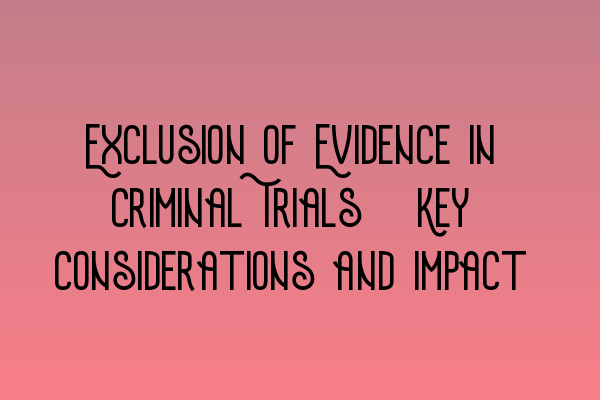Exclusion of Evidence in Criminal Trials: Key Considerations and Impact
When it comes to criminal trials, the exclusion of evidence is a critical aspect that can significantly impact the outcome of the case. This process involves the removal of certain pieces of evidence from being presented to the jury or considered by the judge. Understanding the key considerations and the potential impact of excluding evidence is crucial for both prosecution and defense teams. In this article, we will delve into this topic and shed light on its significance in criminal trials.
Key Considerations for Exclusion of Evidence
Several key considerations come into play when determining whether evidence should be excluded from a criminal trial.
One of the most important factors is whether the evidence was obtained legally. Any evidence obtained through illegal means can be deemed inadmissible and must be excluded. For example, if the police conducted an improper search without a warrant, any evidence discovered during that search may be excluded.
Another consideration is the relevance of the evidence. To be admissible, evidence must be both probative and material to the case. Probative evidence directly supports or disproves an element of the crime, while material evidence has a logical connection to the case. If the evidence lacks relevance, it may be excluded.
The manner in which the evidence was obtained is also crucial. If the evidence was obtained through coercion or in violation of the suspect’s rights, it may be excluded. Moreover, if the evidence was tampered with, it may raise questions about its authenticity and admissibility.
Furthermore, the court considers the prejudicial impact of the evidence. If a piece of evidence is overly prejudicial to the defendant, it may be excluded to ensure a fair trial. However, it’s important to note that not all prejudicial evidence is automatically excluded. The court will weigh the probative value against the potential prejudice to determine admissibility.
The Impact of Excluding Evidence
The exclusion of evidence can have a significant impact on the outcome of a criminal trial. If a critical piece of evidence is excluded, it may weaken the prosecution’s case or limit the defense’s ability to present a strong argument. In some cases, the exclusion of evidence may even result in the dismissal of charges.
On the other hand, the exclusion of evidence may also work in favor of the prosecution or defense. For example, if evidence was illegally obtained, its exclusion may protect the integrity of the criminal justice system and ensure that constitutional rights are upheld.
Ultimately, the exclusion of evidence is a balancing act between the interests of justice and the protection of individual rights. It is the responsibility of the legal professionals involved to present compelling arguments for or against the admissibility of evidence and persuade the court to make the appropriate decision.
At SQE Criminal Law & Practice Law UK, we understand the complexities and importance of the exclusion of evidence in criminal trials. It is a topic that aspiring solicitors must thoroughly grasp in order to navigate the challenges of the legal profession effectively.
If you’re interested in furthering your legal knowledge and preparing for the SQE exams, we offer comprehensive SQE 1 and SQE 2 preparation courses. Additionally, our practice exam questions and practice mocks can help you gain valuable insights into the exam format and enhance your chances of success.
Stay updated with the latest SRA SQE exam dates and ensure you’re well-prepared for your upcoming exams.
References:
